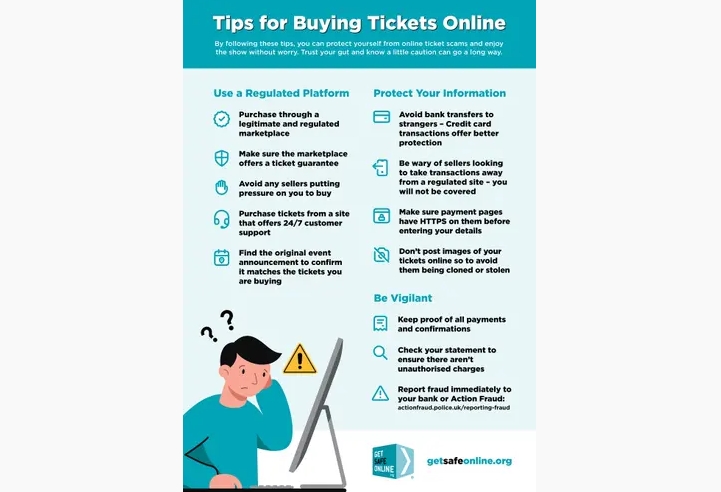New research by Get Safe Online has uncovered a growing crisis in ticket fraud, with one in eight consumers who purchase live event tickets via social media falling victim to scams. Despite the risks, more than half of consumers perceive social media platforms as safe or remain indifferent to their lack of consumer protections.
The report highlights that desperation to secure tickets for highly sought-after events is a key factor driving risky purchasing behaviour. More than a quarter of consumers (27%) admitted their eagerness to attend a show led them to turn to social media platforms, often unverified.
This issue was starkly evident during the recent Oasis ticket sale, where overwhelming demand on a primary ticket platform left millions of fans unable to buy tickets. Many turned to social media, only to encounter scams. Lloyds Bank reported that victims of Oasis ticket scams lost an average of £346, with 90% of incidents traced to social media transactions.
The risks are significant, with 17% of consumers who bought tickets on social media experiencing negative outcomes. These included phishing scams, fake tickets, multiple sales of the same ticket, and sellers disappearing with buyers’ money. One victim, Carly J, shared her experience: “I thought I’d struck gold finding Fred Again tickets for £100 on Facebook Marketplace. But after I paid, the seller vanished, deactivating their account. It was a harsh wake-up call.”
Londoners appear particularly vulnerable, with 76% expressing trust or neutrality toward purchasing tickets via social media—well above the national average of 54%. This misplaced confidence comes at a cost, as 21% of Londoners reported unknowingly purchasing fake tickets. Younger consumers are also at risk, with over half of 18–34-year-olds admitting to buying tickets through social media. Their impulsive decisions often result in the highest financial losses.
Tony Neate, CEO of Get Safe Online, described the situation as a “perfect storm,” with limited ticket supply, heightened fan passion, and a chaotic primary ticketing system creating an ideal environment for scammers. “Fans urgently need safe alternatives with robust protections,” he said. “Competition and regulated secondary marketplaces can provide consumers with more choice and security.”
The report calls for industry reforms, including secure and regulated secondary marketplaces, to better safeguard consumers. Over three-quarters of respondents (79%) supported such measures to ensure ticket purchases are protected by guarantees.
With live events becoming increasingly central to social life, experts urge consumers to remain vigilant, research sellers, and avoid purchasing tickets on platforms offering no protection. Neate added, “The industry must act to meet fans’ expectations and protect them from exploitation.”
As Black Friday approaches and enticing deals flood social media, consumers are warned to think twice before making purchases. For now, the responsibility largely falls on buyers to exercise caution, but the call for safer systems is growing louder. For further information on buying tickets safely online visit: Buying Tickets – Get Safe Online.

